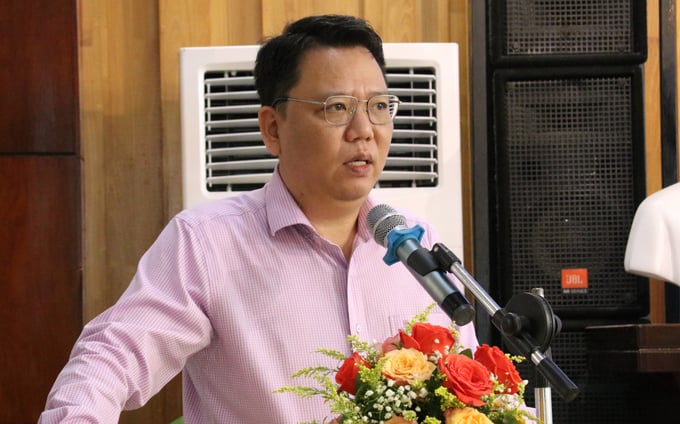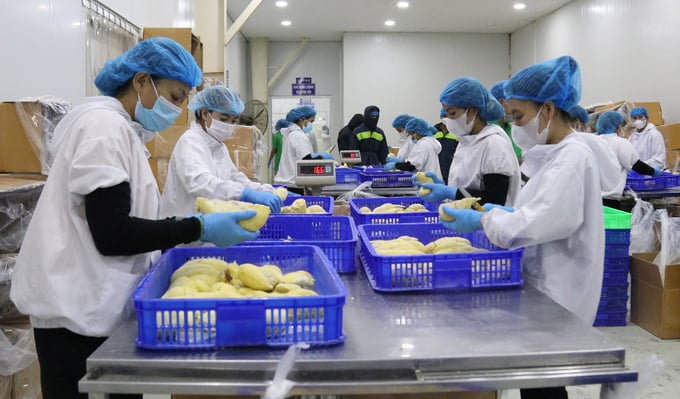May 24, 2025 | 16:22 GMT +7
May 24, 2025 | 16:22 GMT +7
Hotline: 0913.378.918
May 24, 2025 | 16:22 GMT +7
Hotline: 0913.378.918

Mr. Ngo Xuan Nam, Deputy Director of Vietnam SPS, spoke at the conference. Photo: Quang Yen.
On the morning of December 8, the Viet Nam Sanitary and Phytosanitary Notification Authority and Enquiry Point (Vietnam SPS) coordinated with the Department of Agriculture and Rural Development of Dak Lak province to organize a conference to disseminate regulations and commitments on SPS in the EVFTA.
Attending the conference were Farmers' Associations, Cooperatives, Businesses, Industry Associations, and leaders of the Department of Agriculture and Rural Development of Dak Lak, Dak Nong, Lam Dong, Khanh Hoa, Phu Yen, and Ninh Thuan provinces.
The conference introduced IPM integrated pest management for fruit trees, pests, and pest prevention solutions; EU market regulations for products of plant origin imported from Vietnam; Introduced technology for preliminary processing and preservation of some types of seafood exported to the EU; Introduction to software for searching databases of regulations for each market.
Mr. Nguyen Hac Hien, Director of the Department of Crop Production and Plant Protection of Dak Lak province, said that the local strength is agricultural production. The region has been granted 83 production unit code for durian, mango, lychee, longan, banana, and chili, with a total area of 3,219.38 hectares. At the same time, the province has issued 24 packing house codes.
"The free trade agreement between Vietnam and the European Union has opened up great opportunities for export goods from Vietnam in general and Dak Lak province in particular to the EU market.
The conference will help state management agencies, businesses, and people understand some of the core contents of the Agreement, its impacts and responses, and share practical solutions and approaches. Market results. Companies will have the opportunity to improve export capacity to make the best use of EVFTA incentives," Mr. Hien said.
Mr. Ngo Xuan Nam, Deputy Director of the Vietnam SPS, said that the decrees signed with importing countries had been updated to functional agencies and businesses to implement regulations and remove regulations promptly to satisfy the market.
According to Mr. Nam, the exporting country will receive a warning if a business violates food safety or disease safety.
"All of these warnings will first affect businesses, second the entire industry, and finally affect the reputation of Vietnam's agricultural sector.

Vietnam SPS is actively disseminating the regulations of the Free Trade Agreement between Vietnam and the European Union. Photo: Quang Yen.
For a long time, we have thought the EU is a strict market regarding standards. However, through many conferences and expert opinions, it is time for us to abandon this concept. Any country has regulations on food safety management to protect people's health.
Therefore, Vietnamese producers need to abandon this concept. If we keep thinking that the international market is difficult, we will never be able to meet their requirements. To meet international regulations, Vietnam needs the participation of all levels and sectors, from farmers and businesses," Mr. Nam said.
Recently, updating and disseminating regulatory information to markets on food safety measures and animal and plant disease safety (SPS) is significant, according to Mr. Nam. The reason is that Vietnam SPS receives about 100 notices and drafts on changes to SPS measures, including changes in pesticide residue levels, veterinary drugs, and subject quarantine regulations on materials in contact with products every month.
Improving the quality of Vietnam's agricultural and food products and ensuring safety when exporting are necessary jobs. Therefore, removing difficulties for businesses updating and guiding market regulations should be given attention and attention by management agencies.
As the focal point for information and guidance on food safety and quarantine, Vietnam SPS commits to being ready to answer the difficulties and problems of businesses.
"Updating and disseminating SPS regulations to management agencies, businesses, cooperatives, and farmer households is especially important because SPS regulations are mandatory," Mr. Nam emphasized.
In the fourth quarter of 2023, Vietnam SPS organized a series of conferences to disseminate SPS regulations in key export markets. In particular, new-generation FTAs such as CPTPP, UKVFTA, EVFTA, and RCEP considerably interest businesses and producers.
This activity has been implemented widely across the northern, central, central highlands, southeastern, and Mekong Delta provinces.
To date, Vietnam has participated in 19 bilateral and multilateral trade agreements, including 16 formally signed agreements and three agreements under negotiation.
As a result, there are many new-generation free trade agreements with mandatory commitments and regulations on sanitary and phytosanitary that Vietnam must adhere to to meet the requirements of importing countries.
Translated by Tuan Huy

(VAN) The mutual export of agrifood products between the European Union (EU) and the United Kingdom (UK) must occur again without certification, border controls or other red tape. This was agreed at the UK-EU summit.
/2025/05/22/5121-2-173645_677.jpg)
(VAN) NBSAP Tracker identifies strengths and areas for improvement in the National Biodiversity Strategy, based on each region’s priorities and capacities.

(VAN) The draft amendment to the Circular on rice export trading stipulates a periodic reporting regime for rice exporting enterprises.

(VAN) Dong Thap farmers attained an average profit margin of 64% during the summer-autumn 2024 crop (first season), while An Giang and Kien Giang farmers followed with 56% and 54%, respectively.

(VAN) As a doctoral student doing research on renewable energy and electrification at Harvard University, the author shares his musings on electricity, nature, and countryside memories.

(VAN) The decree on Extended Producer Responsibility (EPR) ensures transparent management and disbursement of support funds, avoiding the creation of a “give-and-take” mechanism.

(VAN) Hue City rigorously enforces regulations regarding marine fishing and resource exploitation, with a particular emphasis on the monitoring of fishing vessels to prevent illegal, unreported, and unregulated (IUU) fishing.